


























Enjoy a more comfortable experience on the water with SeaStar Hydraulic Steering


Have full confidence when you take the helm, with knowledge that you have complete control of your vessel. SeaStar Pro by Dometic hydraulic steering systems, with options for most applications, ensure you will always have a safe and comfortable boating experience.
www.dometic.com



The hunt for the perfect outdoorsman knife is over. There’s only one tool you need: the Whitetail™ Hunting Knife—now ONLY $49!
The consummate outdoorsman never goes on deep woods hunting trips without the essentials. Not just the basics for every hunting trip, but the items he’s come to depend on over the years. Our new Whitetail™ Hunting Knife will quickly become your go-to blade for every expedition. The Whitetail™ is a premium fixed-blade hunting knife that’s perfect for skinning. With the Whitetail at hand, you’ll be ready for field dressing in only seconds, and you’ll never need a separate gut hook tool ever again. The Whitetail™ boasts a mighty 420 high carbon, full tang stainless steel blade, meaning the blade doesn’t stop at the handle, it runs the full length of the knife. According to Gear Patrol, a full tang blade is key, saying “A full tang lends structural strength to the knife, allowing for better leverage ...think one long steel beam versus two.” The comfortable handle is made from pakkawood—moisture-resistant and more durable than hardwood. If hunting is your life, then the Whitetail™ Knife was designed to make your life easier.
With our limited edition Whitetail™ Hunting Knife you’re getting the best in 21st-century construction with a classic look inspired by legendary American pioneers. What you won’t get is the trumped up price tag. We know a thing or two about the hunt–– like how to seek out and capture an outstanding, collector’s-quality knife that won’t cut into your bank account.
EXCLUSIVE FREE
Stauer® 8x21 Compact Binoculars

-a $99 valuewith purchase of Whitetail™ Hunting Knife




complete refund of the


What customers are saying about Stauer knives...


“Good value. Great looking. Sufficiently sharp. Overall an “A” purchase and I ordered three.”
This knife can be yours to use out in the field or to display as the art piece it truly is. But don’t wait. A knife of this caliber typically cost hundreds. Priced at an amazing $49, we can’t guarantee this knife will stick around for long. So call today! Your satisfaction is 100% guaranteed. Feel the knife in your hands, wear it on your hip, inspect the craftsmanship. If you don’t feel like we cut you a fair deal, send it back within 30 days for a complete refund of the item sale price. But we believe that once you wrap your fingers around the Whitetail’s handle, you’ll be ready to carve your own niche into the wild frontier.
Whitetail™ Hunting Knife $79*

Offer Code Price Only $49 + S&P Save $30

PLUS Free Stauer Compact Binoculars
— B. of Maryland TAKE 38% OFF INSTANTLY!







When you use your INSIDER OFFER CODE




or those of us afflicted with the fishing bug, nothing will deter us from returning to the ocean. We’re often planning our next trip before the current one is over. There is no difference between fishing daily, or being deprived for weeks, the fisherman’s mind will never stop nagging to get back out there.
Fishing stories and trophies are a great way to keep the inner fishing-monster soothed in between trips.
Photographs are an easy way to relive moments, and should not be overlooked. It doesn’t take much effort to get out a camera and capture the catch when it hits the deck while its colors are vibrant and the smile is fresh on the angler’s face. Friends don’t let friends take deadfish dock photos without at least a few taken out on the blue.
When it comes to fishing trophies, there is a whole lot more to be taken home than just some good photos.
The standard go-to trophies are wall mount replicas, which can easily be reproduced with some measurements and photos. This provides the opportunity to release the fish and also be able to take it home with you. Gray’s Taxidermy does excellent work with this type of customization, and outfits most charter companies with the

 By Capt. Quinlyn Haddon
By Capt. Quinlyn Haddon
required paperwork to get you started on this process. Make sure to ask your captain about mounting your catch before you release the fish.
There are still people who work with the tried and true art of fish taxidermy, utilizing the fish itself, but these services are harder to find, and the product doesn’t last forever.
Gyotaku fish rubbings are another way to accredit the true size of a trophy fish. The fish itself is painted and printed on paper. This method does not allow you to release the fish, but if you work quickly, and utilize acrylics, the fillets may still be consumed. This is a fun method to try on your own, but there are artists you can hire for this as well. These trophies work out better when wall space at home is more limited.
Various parts of the fish can be taken and treated, such as bills, tails, skeletal systems and even eyeballs transformed into epoxy shot glasses. These trophies can have some of the best outcomes, but require some involved and stinky DIY processing. There are a variety of techniques for this, and endless creative potential.
Participating in fishing traditions is another great way to boost the excitement of a first catch, and add to the memory. Who knows how these got started, but it is our communal obligation to keep them alive.
I’m sure there are some I have missed, but here
are the ones I know of, and practice.
When you catch your first tuna, it is customary to eat the heart or, at very least, take a bite out of it. It’s not bad with a bit of lime and a chaser. Tastes a bit like what I would imagine tuna-jerky to taste like.
When you catch your first marlin, you earn a celebratory jump in the ocean. Usually, this is done back at the dock for safety reasons. This is the most refreshing dip you’ll ever take.

When you catch your first swordfish, your crew will hollow out the eyeball, as to make a cup out of it, and you then take a drink from it. I highly recommend being quick about this before extra slime leeches out into your drink. Don’t worry, it all tastes like victory.
However deep your commitment to your fishing affliction may be, the best trophy will always be memories of having a good time. Most importantly, don’t forget to enjoy being out there. Your local captains understand that it’s difficult to manage life between fishing trips, and we are here for you. Blue Magic Charters is available for your next fix, out of Marathon, Florida Keys.
Capt. Quinlyn, of Blue Magic Charters, is also a Gyotaku artist and a Gray’s Taxidermy agent. Contact her at (504) 920-6342 and follow her social accounts @CaptainQuinlyn.

small green drake just as it was annihilated by a frisky brown trout.
I hurried to tie on a Colorado Green Drake and caught a brown on my first cast. My second cast was taken as soon as it hit the water—a nice rainbow. By then, drakes were all over the surface and the trout were feeding without hesitation. One trout went airborne, and I swear it was looking for the next green drake on its way back down.
It was dry-fly heaven fishing my 7.5-foot “Perfectionist” bamboo rod (made by “Preacher Jim” Beasley, of Crossville, Tenn.) and a green drake tied on 5X tippet. But over the ridge came ominous blue-tinged storm clouds. The pyrotechnics began immediately, with lightning pinging down all around me. Seeking safe haven, I dove into a shallow creek bed that emptied into the river. Elk, deer and bear tracks had beaten down the bed and formed foot-high banks. It was muddy but much safer. At first, it was too dangerous to even sit up, so I lay in the mud and watched the hatch, which was still in full swing.
In 25 years fly fishing, I’ve only experienced two bona fide green drake hatches. The second time I witnessed one of these hatches it was spectacular, the stuff of legends.

Green drakes are large mayflies that, under the right conditions, hatch in huge numbers and send trout into feeding frenzies. It happened for me one afternoon at about 8,750 feet of elevation on a Colorado river. The left bank hugged the base of a mountain ridge and the right bank opened onto a flat meadow of grasses and wildflowers. It was hot and windy—a tough day for fishing dry flies, but I’m a stubborn dry-fly bigot. I refused to nymph and hadn’t caught a single fish until the weather changed. Clouds floated over the ridge and the temperature and pressure dropped. A bright-white flash and instantaneous rumble sent me toward the truck, but on the way I spotted a
Eventually, the lightning lessened, and I was able fish. Once, two fish—a rainbow and a brown—came from opposite directions and arrived at my fly at the same time. A violent collision of noses ensued, and both fish quickly retreated. My drake was partially submerged after impact, but a different brown appeared, circled once, and daintily took the fly. He was not happy when I hooked him!
Once, I was surprised when my drake drifted almost back to me without a strike. Just as I was picking up the fly to cast again, an upstream brown came like a freight train. It took the fly on the uptake, went airborne and hit me in the chest. When you get nailed in the chest by a 16-inch brown, it’s gotta be a green drake hatch!

This short story (copyrighted by the author) and many other true-life fly fishing adventures can be found in Michael Fitzsimmons’ book “Adventures of a Dry-Fly Junkie,” available only on Amazon. Contact the author at dry_fly_junkie@hotmail.com.


Everyyear in Basel, Switzerland, the world’s best-known luxury watchmakers gather to display their new timepieces.
It’s a great event for spotting timepieces that standout–– in performance and in personality. We saw one impossible to ignore: a precision dive watch with an arresting green dial. But we also saw the five-figure price tag and knew we could bring our customers that exact same precision and stand out appeal for a whole lot less. The Stauer Evergreen Diver is that timepiece.
Built like a submersible battleship with a stainless steel case, caseback, and band, the Evergreen Diver is water-resistant down to 660 feet or 20 atmospheres, a feat facilitated by a hardened crystal and screw-down crown.
Green On Your Wrist AND In Your Pocket. You could pay an awful lot elsewhere for this verdant virtuoso, but the majority of the cost is in the big designer name upcharge. We think those guys are all wet. This is how you own a top-of-the-line dive watch without helping pay for some marketing guy’s yacht.
• Precision crystal movement


“Whether
Satisfaction Guaranteed or Your Money Back. Wear the Evergreen Diver for 30 days. If you’re not completely happy, send it back for a full refund of the item price.
Limited Reserve. A watch of this caliber, with a price that won’t drag you under, takes 6 months to create and won’t stick around for long. Call today!
Stauer Evergreen Diver Watch non-offer code price $399† Offer Code Price $99 + S&P Save $300

You must use the offer code to get our special price. 1-800-333-2045

Your Offer Code: GDW163-01

• Screw down crown
Rating of A+

Please use this code when you order to receive your discount.
• Stainless steel crown, case, caseback & band
• Magnified lens over date window at 3 o’clock
• Water resistant to 20 ATM
• Fits wrists up to 8 ½"


boat. It really is a very nice boat, notwithstanding the price point.”
The Mitzi Skiff 17’ is a stripped-down and customizable version of the 17’ Tournament, which comes with the options Grubbs said most of his fishing customers were asking for. Both boats draft just 7 inches loaded, they pole easily, they pole straight, and they reach speeds into the 40s with a 60 hp engine.

While the 15’ is a one or two-man boat that’s at-home on the flats, the 17’ can fish three people and it’s got better range. The 17’s primary purpose is still as a flats boat, yet it also doubles admirably as bay boat.

“It’s not just a flats boats; it’s a little bit of an open water boat, too,” Grubbs said.

The 17’ features a modified V-hull with an 11-degree deadrise at transom. There’s no hull slap, and rolled gunnels knock down spray for an exceptionally dry ride. They are built for light weight to run shallow, yet they are solid and durable to stand up to long years of heavy use.
Going back to the mid-1990s, Mitzi Skiff has led the industry with no-nonsense flats boats for skinny-water anglers.


In the very beginning, Tom Mitzlaff’s intent was to design the boat he needed to fly fish the flats. He couldn’t find an affordable boat on the market with the shallow draft, clean layout and quiet maneuverability he needed, so he designed and built the original 15-foot Mitzi Skiff.
That boat revolutionized the marketplace. Mitzi Skiff became the brand for skinny-water anglers who value simplicity and functionality. A Mitzi does everything the pricier skiffs do, yet they are affordable enough for any angler to own


and operate.
About 30 years later, Mitzi has expanded to offer 15’, 16’ and 17’ skiffs that all perform the purposes of the original design exceptionally well. Continued innovation has made Mitzi a boat other builders imitate, and they still come at a significantly lower price point than the competition. The 17’ and the 17’ Tournament have become the brand’s hottest sellers.
“The 15’ took the micro-skiff market by storm,” said Brad Grubbs, who owns and manufactures Mitzi Skiffs in North Carolina. “Since then, the brand has sort of evolved toward the 17’, which works just fine as a multi-purpose
From hideaway pushpole holders to flushmount hardware, Mitzi has obviously put some thought into making decks clean and fishable for fly anglers. Large, clean and stable casting decks are something Mitzi has become known for.
“Keep it simple stupid, and if it ain’t broke don’t fix it,” Grubbs quipped. For nearly three decades, Mitzi has built skiffs for anglers more interested in fishing than in spending a lot of money. It’s a philosophy that works.
Mitzi Skiff boats are available exclusively through select dealers. For more on Mitzi Skiffs, go to www.mitziskiffs.com.
Performance Bulletin Available
59 YEARS OF REPOWER EXPERIENCE!
Mastry Engine Center has received the Suzuki Marine Super Service Award and has been ranked #1 in Suzuki Marine US Sales!
Repower packages designed to best fit your needs and not stretch your budget. Financing available.





All Suzuki repowers come with the new Suzuki 5-year factory warranty.
Many of our Suzuki RePower Centers feature Water Accessible Drop Travel Lifts.

Suzuki RePower Centers are stationed around the southeast to help with your Suzuki service and repower needs.













• Charlotte Harbor - Match current Gulf Coast regulations, and:


In a move similar to recent management changes for red sh, e Florida Fish and Wildlife Conservation Commission (FWC) is looking at changing the way it manages snook. At its May meeting, FWC proposed creating new management regions for snook to allow better
control over localized di erences in the shery. e proposed rule changes would:
• Establish nine snook management regions.
• Match current Gulf or Atlantic coast regulations within new regions, except for Charlotte Harbor.
- Implement a two- sh vessel limit,


- Include September in the summer season closure.

“ is adaptive, holistic approach to sheries management is the key to conserving our sheries for future generations,” said FWC Chairman Rodney Barreto. “On behalf of the Commission, I want to encourage anglers and anyone interested in the future of snook in Florida to get involved and share your valuable feedback with FWC sta .”
Sta will continue gathering input on the proposed rules ahead of a planned nal rule hearing at the October Commission meeting. Submit public comment on snook regional management by visiting MyFWC.com/ SaltwaterComments.
In other news from the meeting:
• Proposed no- shing zones around three goliath grouper spawning aggregation sites was tabled with no action taken and no plans to resume discussion. e areas that were being considered for 700-foot no- shing zones around wrecks and reefs remain catch-and-release only.
• Management changes were approved for greater amberjack in Atlantic state waters. An April spawning season closure for recreational anglers will be established, the commercial size limit was reduced from 36 to 34 inches, and the import size limit was reduced from 36 to 34 inches statewide. ese changes will go into e ect at a later date.
For more information, go MyFWC.com.





















Trade-in your dirty, uncivilized, oil-burner for an environmentally responsible, clean, quiet, efficient Suzuki 4-stroke!


For a limited time, when you purchase a new Suzuki outboard from an authorized Mastry RePower Center you will receive a Special Trade Allowance for your dirty and outdated 2-stroke outboard. This is Mastry’ s commitment to help keep our waterways clean as well as making it easier for you to improve your boating experience with an up-to-date quiet, efficient 4-stroke outboard. Contact your closest Mastry RePower Center for the details of this Exclusive Mastry RePower Center Offer.












The 2023 CCA Florida STAR competition presented by Yamaha will o er more opportunities to win than ever before. is 100-day, summer-long competition begins Saturday of Memorial Day weekend and invites CCA members, non-members, anglers and non-anglers to take a shot at winning their share of prizes valued at more than $500,000 including boats, motors, electronics, tackle, scholarships and more. e winning begins even before the competition does with the early registration package providing a complimentary ra e ticket to win a Hewes Red sher, a 25 percent discount from TH Marine and free access to the Red sh Mastery course from Salt Strong.

But it’s not just about anglers winning but the shery too. Not only can participants become winners, they become citizen biologists and citizen garbologists by submitting photos of their catch or garbage collected during the competition in the STAR app. In order to win, participants must take their entry photo on the 2023 CCA FL STAR
O cial Measuring device which can be picked up for free a er May 20 in any West Marine store or one of the many other STAR distribution locations throughout Florida.
e competition has a division for everyone, from the non-angler to the experienced angler. It is comprised of 15 divisions targeting 12 inshore and o shore species plus the Costa Kick Plastic Trash Division presented by Papa’s Pilar, which encourages cleanup of trash from Florida’s coastal waters.
STAR’s signature Tagged Red sh Division o ers seven winners, ve adults and two youth, the choice of a Contender Boats 22 Sport, Path nder Boats 2200 TRS, and STAR would like to welcome back Carolina Ski o ering the 162 JLS. STAR has additional new Tagged Red sh sponsors with Dek Kat Boats o ering a 27 Flatz Kat and Sea Doo
and Can-Am o ering a fun package of a Sea Doo FishPro Trophy and the Can-Am Defender. Each boat will be powered by a Yamaha. Be the rst winning tagged red sh angler for your choice of all these packages as your prize.
Once again in 2023, an ALTA SUPER STAR tagged red sh is swimming Florida waters. If it is recaptured, the winner will receive $50,000 cash! For the rst two youth anglers who win in this division, prizes include a tiller boat powered with a Yamaha outboard, a trailer, a Minn Kota trolling motor and Humminbird electronics.
Each coastal county will have, on average, four tagged red sh for a total of over 160 prizewinning sh. e best opportunity to catch one of this year’s tagged red sh will be in Citrus and Charlotte Counties, STAR’s 2023 Destination Counties, which each have eight tagged red sh in their coastal waters.
For the o shore anglers, the Tigress Outriggers and Gear Tagged Dolphin Division o ers one winner a $10,000 cash prize. e rst STAR registrant and CCA Florida member who catches one of the tagged dolphin will win. Twenty dolphin (Mahi Mahi) will be tagged and released for STAR in the Lower Keys.
STAR is a family-friendly competition, and CCA Florida youth members (ages 6 to 17) can participate for free. Kids are encouraged to submit entries in the Youth Scholarship Division presented by Realtree Fishing for an opportunity to win one of twelve scholarships totaling $100,000. To date, the Florida STAR competition has awarded $800,000 in scholarships to youth from all over the state. Another great component of STAR for youth participants is they can earn 30 minutes of community service for every 5-gallon bucket of trash they pick up from Florida’s coastal waters and submit via the STAR app.
Other divisions include the Power Pole
Conservation Division, Bona de Kayak Division and Ladies Division as well as the Yamaha Guides, which allows guides to participate when they are not on a charter for hire. Since most division winners are determined by a random drawing, it is not about catching the biggest sh; any size sh can win. Remember, every sh you catch between Saturday, Memorial Day weekend and Monday, Labor Day, o ers the CCA member who is registered in STAR the opportunity to win their share of nearly $500,000 in prizes and scholarships. But you can’t win If you are not registered.
Not only is the STAR competition a wonderful way for participants to win amazing prizes, it is a tool to gather catch data, it creates awareness for conservation, our sponsors and CCA Florida. Launched in 2015, the competition has set the bar for other shing tournaments to follow by implementing conservation-friendly alternatives such a catch-photo-release format and a trash division.
Florida STAR focuses on conservation with its technology-based, CPR format and dedicated smartphone app which promotes the proper handling of species and allows participants who are members of CCA and registered in the competition to upload photos of their catch or trash buckets in the STAR competition and be rewarded for their e orts. is eliminates the requirement that some traditional tournaments have to harvest or capture and transport sh to win. CCA Florida also provides access to the data collected from the app to other conservation organizations and universities to help educate the public on the importance of protecting Florida’s marine resources and for use in their studies on conservation, habitat and stock assessments.
For more information and to register, visit http://cca orida.org/event/star/.












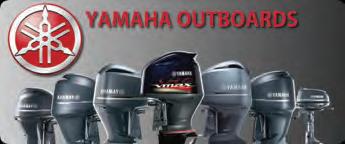








Ever since I started shing, the basics have stayed the same. If we all tell the truth, none of us started out catching gags and wahoo. It was probably more like bream, bass, cat sh and shad. Granted, we didn’t sh as many lures back then as we do now, but the basics are still the same. Back then, we shed a lot of the four or ve loop sherman’s knots for soaking baits. I no longer use these.
Now, I tell folks if you know how to make ve connections, you can go anywhere in freshwater or salt and sh for almost anything. ese ve connections are:
1) Loop knot
2) Snell
3) Uni knot (includes uni-to-uni knot)
4) Crimps(cable and uoro)
5) Double tackle loop
Granted, there are other helpful knots like the Piere knot, which is a good wind-on for connecting braid to Floro, but I’ll stick to my guns here and say these ve are the ones I use. ere are three of these I can tie in pitch black dark and have tremendous faith they’ll
never fail.
I can hear it now… “Yeah, you forgot this one and you need to know this one.” OK, but the title of the article is “getting back to basics,” and these ve work for everything I need to do. As soon as any of these
meat and potatoes of the freshwater, inshore and nearshore shing I do. I make connections from braided main lines to smaller uoro leader material with the uni-to-uni. e loop knot works best on most lures. e loop knot gives any lure the freedom it needs to swing or change directions freely.
e snell has a place for freshwater, inshore, nearshore and o shore. is is simply because I feel the snell is a requirement for all circle hooks, in my humble opinion.


e crimps make for ease of heavy-duty connections from uoro leaders to swivels and then to braided main lines. e crimps also make heavy-duty cable connection to stinger hooks and to arti cial lures.



ve starts failing on me, I’ll consider something else, but between now and then, these work for everything from bream to bill sh. e loop knot and uni knot make up the


I’ve got some videos on my website on how to tie and utilize these ve connections. Some of these videos have some age on them, and I have received some request to make new ones with better lighting, backgrounds, etc. I may very well update them in the near future. However, all these videos show the knots in pretty good closeup detail. Stay in touch with my you tube channel and website for these new videos.
See more from Tim Barefoot at Barefootcatsandtackle.com.


The Sport shing Championship held its inaugural event, e Catch, in mid-April and it sprinkled teams of top local captains with well-known NFL players for o shore action out of Miami.

NFL players at the event included stars like Justin Herbert (QB, L.A. Chargers), A.J. Brown (WR, Phi. Eagles), Dalvin Cook (RB, Minn. Vikings), DeAndre Hopkins (WR, Ariz. Cardinals), Chris Jones (DE, K.C. Chiefs), Matthew Judon (OLB, N.E. Patriots), Patrick Surtain II (CB, Den. Broncos) and Quinnen Williams (DT, N.Y. Jets).
e football players were split into groups
 By Astrid DeGruchy
By Astrid DeGruchy
to sh with renowned captains aboard powerful sport shers and be challenged in ways they may never have experienced before.



e event was broadcasted live from the Fontainebleau in Miami. Spectators were able to tune in and follow the hook-ups in real-time as NFL superstars got tight, reeling in species like black n tuna, sail sh, yellowtail snappers, bonitas, mahi and more.

rough the tournament, the players learned that catching these sh is no simple task, and that it requires a unique set of skills to hook and successfully reel them in. e experience gave

them a newfound level of respect for anglers and, for many, sparked a newfound interest in shing. e competition was close, but Team Gypsea, led by Capt. Taylor Sanford and supported by fourtime Pro Bowlers Matthew Judon and Dalvin Cook, claimed the championship trophy. e grand prize winnings consisted of a $100,000 donation to the Coast Guard Foundation.
“It was fascinating to watch elite NFL athletes realize how much e ort it takes to reel in saltwater sh,” said Je Stillwell, president of Salt Life. “ eir willingness to learn about techniques and take a genuine interest in doing things correctly shows why they are top-tier athletes. Plus, there is nothing like seeing someone catch a sh for the rst time!”
SFC’s e Catch had various components, including a pro-am tournament with other NFL legends and athletes. e Awards dinner was incredible, featuring a breathtaking drone light show and a Havana-themed atmosphere.
For more, visit sport shingchampionship.com. Follow Astrid Degruchy’s shing adventures on Instagram @catching_astrid.























Jamie & Deidra Thrappas
Contributing Writers :
Freak on the Beach
Marco Pompano
Capt. Jamie Thrappas
Yellow Dawg Fishing yellowdawgfishing.com
Capt. Michael Savedow 386-689-3781

Cap. Evan Sanders solfishing.com
Capt. Barry fishingguidedaytonabeach.com
Capt. Bryn Adams 1-800-525-3477
Capt. Matt Graves www.limitlessfishing.com
Kyndal Lynn @kyndal_lynn
Blake Abbey @blake_jay_abbey
Skye Burkhardt @Brassyangler87
For advertising inquiries, Call Jamie at 386.366.3424 or email volusia@CoastalAnglerMagazine.com
Weed, weed, weed, weed - and I don’t mean the smokin’ kind… It’s on the beaches.

Northeasterly winds. For the last few weeks the beaches have been inundated with Sargossa seaweed. Not the main batch but enough that has broken off and washed in.
The good news is the West winds arrived and all the seaweed mysteriously disappeared! The ocean temperature has been a perfect 74°. The best result is that the pompano stayed, and it’s on! Ya, mon!
During the time of the seaweed inundation there were only a few hours to fish, and the pompano were there, so I knew when the seaweed went away, they were going to go crazy from hunger.
Here’s a little information on what Sargassum seaweed is. Sargassum seaweed is a macroalgae that has a tendency to show up in April and stay to October, with the peak season being June and July. It generally inhabits coral reefs and shallow waters. There is a 5,000 mile wide bog of the seaweed out in the Atlantic, the biggest one ever recorded, and some of it has already touched South Florida. Fort Lauderdale to Cocoa Beach have a big problem. It usually comes in waves. Another interesting fact is Sargassum seaweed is also used in the island of Jamaica as fuel. Burning it leaves very little smoke. It’s used for cooking jerk chicken and pork. Bet you didn’t know that!.
The weeds went away with some westerly winds. Cleared, we went to the beach early and set up. It was Bamba time, and the sun wasn’t even up yet. The rods were dancing.
A few local fishermen were out here, together. Chip and Tommy all running to the rods. Perfect way to start the day.
The sun is up now, and the water is a perfect blue-green. Not a lot of current. Another tropical Wilbur By the Sea morning.
In between catching pompano, a lot of lady fish are chewing it up, with some bluefish in the mix. My Vietnamese friends like to freeze the lady fish, use a spoon to scrape out the meat, and make their favorite fish balls, a delicacy.

We are having a little fillet attack at my place. We put on the reggae music with Collie Buddz singing his new song “Take It Easy,“ and I agree with that! Let the filleting begin, as me and these fillets are heading to the smoker.




rEEL hArMOny
FiShinG ChArTErS
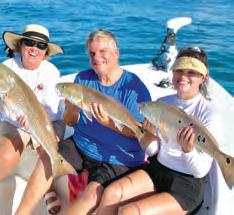
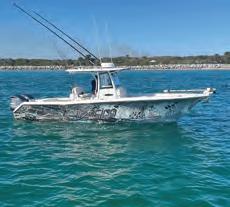


Capt Marty Goldys
Call for a 5 star Fishing Experience
Inshore • Snook • Redfish
Tarpon • Flounder
386-679-0317
www.reelharmonyfishing.com reelharmonyfishingcharters@gmail.com

nEw LEGACy FiShinG
ChArTErS
Capt Marshal Wallot
Nearshore and Inshore Fishing
Trophy Redfish & Black Drum
Tarpon • Snook & More
386-214-9595
www.newlegacyfishing.com marshalwallot007@gmail.com
nO PrESSurE ChArTErS
Capt austin pons
Offshore/Inshore Fishing Year round
Mahi • Sailfish • Grouper
386-566-0659
www.nopressurefishingcharters.com nopressurecharters@gmail.com

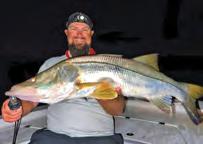

STriPPin LiPS FiShinG
ChArTErS
Capt dave Caruthers
Offshore and Nearshore
Fishing Trips Year Round
Wahoo • Snapper • Grouper
Tuna • Snook • Redfish
386-383-9881
www.strippinlipscharters.com dcaruthers50@gmail.com
DrOP EM DOwn FiShinG
ChArTErS
Capt eriC sChWeikart
Inshore and Offshore fishing trips

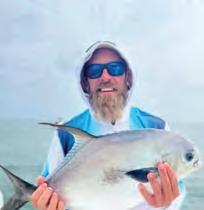
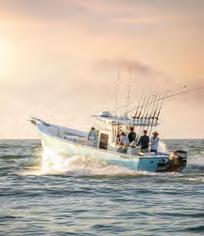
NSB / Daytona
Redfish • Snook • Flounder
Snapper • Cobia
407-415-8281
erikschweikart@yahoo.com
POLE DAnCEr

FiShin’ ChArTErS
Capt Jeff patterson
Inshore & Nearshore Fishing
Daytona Beach
Redfish • Snook • Triple Tail • Trout
386-451-4992
www.smallboatbigfish.com captainpatterson@yahoo.com
KnOT rACinG ChArTErS
Capt MiChael ChapMan
Offshore & Near Shore Charters
Grouper • Snapper • Triggerfish
Flounder • Redfish

386-576-6889
www.knotracing.com
Knotracingcharters@gmail.com
CAuGhT uP FiShinG ChArTErS

Capt Bruno iMBrunone
Inshore and Offshore Fishing New Smyrna Beach
Snook • Redfish • Tarpon • Cobia
Snapper • Flounder
386-689-7409
www.caughtupfishingcharters.com caughtupfishingcharters@yahoo.com

rEEF wrECKE
Capt John “JJ”
Offshore and Near Shore Fishing Charters “ Year Round”
Snapper • Grouper • Shark Trips
Redfish • Snook • Cobia
386-402-3957
www.reefwrecker.com
johnjellis1996@gmail.com
DriFTwOOD

Capt Jarrod
Inshore/Nearshore/Offshore
Seasonal Wahoo, Swordfish, Tuna, Deepdrop trips

386-295-7908
Capttutt@gmail.com
www.Gofishponce.com








FAMILY, FISHINg, & LEgACY!! These are the three most important things to this month’s Youth Angler Ryan Dougherty! Ryan says that “Boating and fishing” is the way of life for him and his family. Since the day Ryan could walk, he was on a boat with a fishing rod in his hand ready to catch what was biting on the other end.
While sitting down and talking to Ryan, he spoke about his grandfather and father being two of the most influential men in his life. He told the story of learning to fish at a young age on his grandfather’s 230 Everglades. Ryan said that his favorite type of fishing is slow pitch jigging for amber jack off the reefs & wrecks of Volusia County. If the weather is too rough to go offshore, Ryan will head into the back country to target snook and jack crevalle. He also takes every chance he can get to take his friends and family fishing. Ryan said “The one thing I love more than catching a fish is watching my friends and family hook up on their first fish and see the excitement on their faces guessing what it will be as they reel it up.” The past 2-3 years he has been spending more time offshore fishing and chasing his dream fish which is a Blue Marlin. He had one opportunity to land one while vacationing in Costa Rica but the Blue Marlin spit the hook.
Ryan wants to continue his family’s legacy in the boat building community. He wants to eventually work for his dad at Solace Boats and assist in designing new technology and concepts for the next era of Center Console boats. Ryan said that his favorite part of the boat building process is watching the plug being cut by the cnc machine for the new boat.
When Ryan is not fishing, or helping at the Solace Factory, he enjoys watching “Chasing Monsters, and Life by the Bow” on Youtube.
Captain & The Kids presented by Sol Fishing is very proud of all the accomplishments Ryan has achieved in the fishing community. His passion for our local area, conservation, and dedication is next to no other! Congratulations again to Ryan Dougherty for being this month featured Youth Angler!

As the summer rolls in the days get hotter which means the fishing time gets earlier, before sun up is a good time to begin. This is a fun time to fish top water baits til about 8am. Then change to a paddle tail on a jig or an old favorite that people forget about, the gold spoon. Then if you really plan it out right go home in the afternoon, get some sleep and food, let the afternoon showers do their thing and go back early evening and fish through dark or as long as time permits. As you read this you are probably thinking who has that much time to fish? Well, some of us are lucky.
I find that the tarpon, snook, trout, and reds are all available at these times of the day. Now for those of you that fish in the heat of the day look for tree limbs hanging over the water and deep water nearby. Deep water could be 3 or 4 feet. If you are fishing artificial, work them slower during the heat of the day. Use a bottom rig if you are fishing live bait. Tight lines!



 capt. Barry Engl
capt. Barry Engl
Fish With Captain Barry fishwithcaptainbarry.com
(386) 871-8500





Summer is here, that means school vacation time for the kids. The Indian and Halifax River is a great place to teach them the basics of fishing at their skill level, making it easy for them to catch a bunch of fish. For younger children, the best way for them to learn new fishing skills is to fish for the small abundant pan fish, such as mangrove snapper and sailors choice, aka pinfish. They will learn basic techniques to use in years to come to catch bigger and better fish. A small hook will catch loads of smaller fish, but also will catch a surprisingly large fish when a bigger one bites. Use a #4 or #6 hook, a light weight, and a small piece of peeled shrimp then fish in the right spot and the kids will catch fish one after another. They will learn to bait a hook, fight their fish, take a quick photo of a few, then safely unhook them, and learn about catch and release. This is the best technique for them to learn good fishing skills and they will be better anglers as they get older. For kids with a little more experience teach them to freeline fish with live shrimp, or easy to use artificials like a leadhead jig with soft plastic tail. They will catch seatrout, ladyfish, jack crevalle, and more. Don’t make it complicated, keep it easy and fun. Teach them about conserving our marine resources, and to be good stewards of our wildlife in to the future. Snook season is closed June, July and August so you can catch then take a photo and release on linesiders until the first day of open season starts again September 1. Our
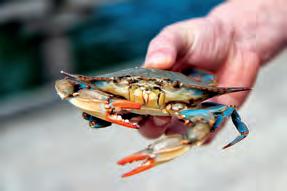


area’s snook population is the best it has been in many years, use gentle care with them for release to keep the good numbers going for years to come. Summer fishing with live pigfish and croakers is a summer tradition on Mosquito Lagoon for Seatrout, Redfish, and Snook. They are also good for many other inshore fish, including snapper, tarpon, jacks, and ladyfish. In the Lagoon, fish them free lined and tail hooked along drop offs, sloughs, and off the edges of flats. Popping the rod gives a tug on the bait, pulling him up off the bottom, encouraging “oinking”, and attracting a
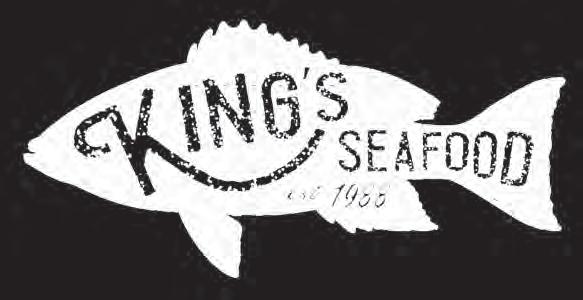

fish to attack. In the Edgewater backcountry fish them along drop offs of any depth, for deeper drops free lined allows them to swim down the face of the under water cliff. Shallower drops, small sloughs, and oyster bars, are all good to try. In shallower spots a float can be added, which will keep the bait suspended above the bottom as they will always try to swim down. Croakers, pigfish, spots, mullet, and pinfish can be prime baits for bull redfish, snook, tarpon, and sharks. Lip hooked for drifting the main ICW channel from Edgewater to Ponce Inlet for big reds. Sight cast to surface rolling tarpon anywhere from offshore Ponce, into the inlet, the ICW channel, all the area bridges over the intracoastal waterway, and through New Smyrna south into the backcountry. Summer rainy season means heavier storm water run off, please learn about and obey the fertilizer ban laws, use less lawn chemicals of all kinds to help protect the already damaged Lagoon and Intracoastal Waterway. The chronic “brown tide” algae blooms have been a major factor in our sea grass loss and decrease of oyster and clam populations. Which in turn directly effects our water quality and fishing now and into the future.

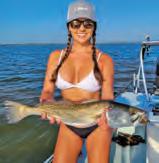
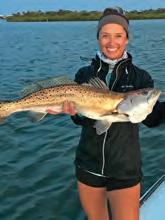



Capt. Michael Chapman is a full-time fishing guide, born and raised in South Carolina. He has been fishing the waters around Daytona and New Smyrna Beach for over 10 years. Early on, he was fishing only part-time as his career as a Nascar race engineer kept him traveling all over the country from week to week. Although his home was in NC, he kept a boat docked near Ponce Inlet and was on it at every opportunity. In fact, the name “KnotRacing” came about when his teammates asked what his plans were anytime they had any off time. The answer was always, “Not Racing”. Capt. Michael now calls Florida his home after moving to New Smyrna Beach in 2021. He has a beautiful daughter who is about to graduate from College of Charleston and two Italian greyhounds that keep him busy when he’s not on the boat fishing.
After Capt. Michael’s career in racing, he founded Knot Racing Charters to further pursue his passion of fishing and to share it with others. Based out of Ponce Inlet, FL, Capt. Michael charters a meticulously maintained spacious 30’ Sea Hunt gamefish with two 300hp Yamahas. This makes for a comfortable ride, whether going deep sea fishing or moving to the best fishing spots inshore. While fishing, the stability of the boat makes reeling in fish comfortable and safe for fish of all sizes. The boat is equipped with a wireless trolling motor, the top-of-theline equipment with the latest electronics, and is up to date with all of the safety features. Capt. Michael’s favorite fish to catch are mahi, wahoo, redfish, cobia, trigger, and flounder, to name a few.
All fishing regulations are followed, and customers can keep and eat acceptable fish. After a successful trip, Capt. Michael will clean, filet and bag the catch for customers to take home or have them cooked up right at the restaurant where the boat is docked for the full catch and cook experience. For anglers who are looking for an unforgettable experience aboard a comfortable boat with top-of-the-line features and equipment, Knot Racing Charters will exceed expectations.
It’s June! The sun is shining, the fish are biting and the water is clear! Wait a minute, the water is clear? If you are familiar with Mosquito Lagoon then you know saying these words outside of winter is rare. Having clear water has opened up some fun opportunities for me to practice sight casting much longer into the year than usual. On top of having unusually clear water, my favorite bait has moved back into our waters. It is officially croaker season, and I am a self-proclaimed, “croaker soaker”. Using croakers as bait used to be a well-kept local secret until the internet came along and made the usage of these guys common knowledge. With croakers back in town, my hunt for gator trout is on!
Croakers are a part of the drum family and get their name from the noise the fish makes when it vibrates its muscles against its swim bladder. While croakers can grow up to 20 inches, the ideal size for enticing game fish is in the 3-5 inch range. Croakers are bottom feeders and feed on detritus, dead and decomposing plants and animal matter, but during the spring spawning season for speckled trout, croakers will often feed upon eggs. With trout roe as one of their favorite snacks, it is easy to imagine why casting a croaker anywhere near a sea trout would sound a dinner bell. Momma trout will protect their eggs while also partaking in a yummy snack!
Spotted sea trout spawn from March to October, but one of the strongest peaks for spawning can be seen in early June. Speckled sea trout do not migrate and rarely travel far beyond estuaries from which they were spawned. Most movement seen by trout is dictated by water temperature as they will move deeper in the colder months and move back onto the flats as the water temperatures rise. The trout population in specific areas is dependent upon successful spawning. It is important
that anglers be aware of the impact they have on the populations when catching breeder size trout. Trout can be very delicate, so it is critical that oversized fish be returned to the water and revived quickly for a chance at a productive spawning season. Trout are batch spawners with the average size female producing 15,000 to 1,100,000 eggs per spawning event.
When I go out searching for “gator” trout, I like to fish oyster beds and toss my croaker right at the drop. Trout naturally forage around oyster beds as these areas are critical habitats for crab, shrimp and baitfish. Croakers dive down and look for a place to hide, so I like to lightly twitch my rod to pull the croaker out of any hiding spots and to get the fish to begin croaking. With the spawning events being in full swing, it’s only a matter of time before a “big girl” will ambush. Seeing these oversized trout and all of their ferocious teeth never gets old! I love catching them but even more so, I love seeing them return to the water. I hope our spawning events stay strong and we continue to see the trout populations thrive here in Mosquito Lagoon. Until next time, tight lines!














June is a great month for fishing in our area, and one of the keys to success is getting out there early ! The inlet will have its fair share of fish especially those upper slot and smaller redfish. We are almost exclusively catch and release with redfish these days and with all of the research coming out on the things being found in our redfish I highly recommend everyone start this practice. Catching them is still a blast though ! Live mullet , cut mullet , shrimp , and croaker are my summer favorite baits. Snook will also be chewing on out going tides during the day and at night. I love dock light fishing in the summer months , even though I don’t get to do it as often as I used to , after fishing all day getting back out at night can be a tough one for us. I like drifting select shrimp through dock lights at night on a free line , no swivels or weights.. The biggest fish will always be just outside of the light so don’t just focus on having your bait directly in the lights. I also love targeting one of my favorite fish to eat in June , mangrove snapper . While these fish will eat on just about any tide I seem to do best on incoming tides , around docks . I like deeper docks at least 6 ft of water or more and moving water. While most keeper fish are in the 12” range I have caught them over 17” inshore around the inlet. Don’t leave your spot after catching a few undersized fish there are usually larger ones hanging in the same location. Small #1 circle hooks are my hook of choice with a smaller live shrimp , plus this helps eliminate hook swallows. Lastly I love playing with tarpon in June. Most of the tarpon I get in June are the 50lb or less fish
that love to jump. I get them on mullet , pinfish, and live shrimp. Once I see fish rolling, feeding , or on my side scan I will freeline baits to them in the current. It takes some effort and not getting a hook up can be discouraging but keep trying and it will pay off. I will even use a float sometimes to keep my bait suspended. If you see a bunch of fish its also worth throwing a larger artificial at them like a Hoggy or a NLBN 8” paddle tail. We have plenty of stock at the shop , Yellow Dawg Bait & Tackle in Ormond if you’d like to swing by we can point you in the right direction. If you would like to get on some June fish give us a call to set up a trip! As always get out there and catch some fish and if you see us on the water say hello!
NSB Outfitters specializes in offshore bait and tackle, as well as inshore, flats, and fly fishing gear, with extensive options in apparel and accessories. New Smyrna Outfitters has the knowledge and experience to guide through whatever type of fishing you’re looking to do.




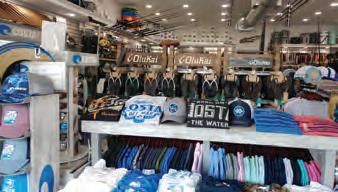

































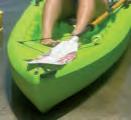
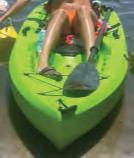



Temperatures are rising and there’s nothing better than taking a kayak out on the beautiful Tomoka River to explore nature and take advantage of the amazing fishery. The launch at Sanchez Park is extremely kayakfriendly and during this time of year, you will be seeing tarpon rolling within 5 minutes. I like to free-line finger mullet or throw very small profile baits that resemble glass minnows when targeting tarpon.



The other day, I launched around 7am and started throwing a top water spook. I landed a few undersized snook early in the morning working the banks and around some lay downs. The Tomoka River has lots of swordspine snook that I find fascinating and always a fun fish to catch. After about 20 minutes on the water, I was greeted by an absolutely amazing Barred Owl. The pictures and video I captured of this owl are worth the trip alone. It was absolutely incredible to see a creature like that in the wild up close and personal. This trip only got better when I switched to my spinnerbait around 8:30am and hooked an absolute unit of a largemouth bass. However, it was short lived as she spit my bait on her first jump. I couldn’t believe it, but carried on with my g oogan squad spinnerbait (bluegill color) and ended up landing 4 bowfin that were so thick I could have caught them all day if I chose to. Bowfin are native to Florida and a lot of fun to catch if you’re just looking for a tug and roll. As the sun came overhead, I headed to the docks since I usually get my afternoon snook bite under any road-
ways or bridges. I was pleasantly surprised when I landed a 30 inch slot snook on my third cast under a shady dock. It was an epic battle that I barely won after she got me hung up on a tree and had to carefully work her out. At this point my day felt complete, but I had a hunch to head back to the exact spot that I lost that “gi rth Brooks” (that tank bass) from earlier in the morning. As I approached the spot, I stood up on my Old Town salty pdl 12 and saw her bedlocked and couldn’t believe my eyes. I grabbed my rod with a ga mbler black and blue Senko tied on and it literally didn’t have a chance. This bass smoked it mid-fall and it was game-on. I was able to get her in the kayak and paddle over to a friend’s dock to snap a quick photo. What a way to complete an absolutely epic day. The Tomoka State Park is also a great place to launch or even anywhere on the side of the road on Highbridge. The possibilities are endless. Make sure to stop by Yellowdog Bait and Tackle if you are in the area and get outfitted for your next adventure!
BlaKE aBBEy
Follow his social media: @blake_jay_abbey








Hours:

If you enjoy early morning big bass action with artificials or wild river shiners come and join us on Florida’s longest river, the beautiful St. Johns River. When you choose schooling bass, go with rattle traps, fast moving shallow running crank baits or small wild shiners. Better yet, catch







threadfin shad, abundant this time of the year using a small cast net. Make sure you use a light wire hook so not to weigh down these fragile baits. After the mid-morning slow down try dark colored plastic worms or deep running crank baits on the deeper drop offs in the main channel.
A big part of summertime fishing, of course is pan fish. Bluegill and warmouth thrive in the warm months and fall prey to a variety of baits, live and artificial.

Remember, the full moon should produce a major bluegill spawn. There are several large bedding areas in Lake Woodruff where Bluegill and Shell cracker gather every year. Ask us at Highland Park Fish Camp for a free map and we will show you where the shell beds are. Best fishing is three or four days before the full moon. Live worms or crickets take the most fish. When the Bluegill are not bedding, work the shore line in the Norris Dead River, north and south, with live crickets suspended on a small float. It is very important to place your bait near floating vegetation. Use light line 6 to 8 pound, and a #4 hook 1/32 oz beetle spins are great too. Yellow with a black strip or white with red breast are the best.








Warmouth will be hitting crickets and live minnows. These heavy built pan fish are fierce fighters and make sweet table fare.



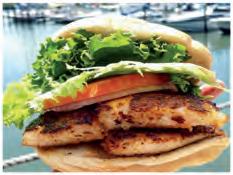


















35th Annual Lady Angler Tournament
JunE 3, 2023
$10,000.00 1st Place (based on 40 Boats)
$ 400.00 entry
Early Bird Entry $ 325.00 (before midnight May 27th, 2023)
Thousands of dollars and great prizes up for grabs for the biggest Cow + Bull Mahi Combo !
3rd Annual King Fish Tournament
JuLy 29, 2023
$5000.00 1st Place (based on 40 Boats)
$250.00 Entry




























































Early Bird Entry $ 225.00 (before midnight July 22, 2023)
Thousands of dollars and great prizes up for grabs for the biggest King Fish caught in State Waters Only ! (Inside 3 Miles)
For More information go to www.hsfc.com or follow us on Facebook Halifax Sport Fishing Club or email us at Tournaments@HSFC.com

The KayaK angler
Kayak fishing sure has become one of the most popular ways to catch fish! It is definitely a great way to get fresh air and enjoy the outdoors, and hey get a little exercise too. As well as a way for Angler’s to avoid the hassle at busy boat ramps. What’s a kayak it gives us a freedom to launch on small canals and creeks down little roads off the beaten path, where we are unlikely to encounter any traffic if at all.
Yeah fishing is all about the adventure being in tune with nature and the ability to scout and find new honey holes. Fishing for my kayak has its bonuses, such as getting back into those skinny waters, Skimming inches deep across grassy flats, marshes and paths through creeks and canals. What a kayak the passion and the will to, it can take you places that even flats boats can only dream of.
The righT kayak
Finding the right kayaked it fits your fishing knees does take a little research. Would you prefer a sit on or sit in kayak.? What is suitable for your size? Would you like a kayak that you can stand on and fish? These are the questions that go on and on you need to ask yourself before making a purchase.
I recommend putting in the work and doing your research as much as possible. Watching YouTube videos is a great start Reading reviews and getting insight from other Anglers who fish the way that you intend to and target the species you would like to catch.

I prefer a sit in kayak and allows me to sit higher giving me better visibility amd a quicker reaction rated while sitting to to cast and or rest or while on the move. With your deck on your sit on kayak I find it a lot more stable and easier to stand up while site fishing.
For paddling and peddling long distances Having a longer narrow kayak helps with tracking straight as well as faster when traveling across large bodies of water. Of course You’ll have to give or take that being said giving up a little bit of stability with a more narrow fast track and kayak. However is worth it if you plan to cover lots of water and enjoy traveling and the journey.
I myself have a pelican 130 HD hydryve With a paddle drive system. It gives me the ability to cross large bodies of water and rivers with depth. And within seconds I can easily pull the plug the dryve system back in. Example when I’m fishing the flats I’m able to pull the system and 99% of the time I am paddling or polling rather than peddling due to being in inch deep water.
My pelican has amazing tracking, lightweight and has a wide deck with
the space and stability to stand and sight cast my catch.
As I understand it, many anglers believe we need to blend with nature in their vessel with earth tones such as greens tans brown camouflage neutrals. Pssssh the fish don’t care or can see what color your kayak is. So if you want lime green or pink go for it or bright colors to express you while you live your passion and enjoy the outdoors go for it! It also allows boaters to see you from a far keeping you safe especially while there are motors buzzing around and also keeps other kayakers from inadvertently blowing up your fishing spot. And let’s face it brighter colors make for a better and more vibrant fish photo.
To save time and for safety while on the water you can use a piece of styrofoam or a quarter piece of pool noodle to hook your choice of lures on for switching baits and saves you time while the fish are blowing up as well preventing me from hooking myself and having to go into dry storage to get to my tackle box.
While fishing skinny water and chasing Reds on the flats. A push pole can be your best accessory for maneuvering through the shallows and keeping your stealthy when stalking your catch.


I find a paddle holder can be your best friend while polling it not only keeps your paddle in place but also pairs with your push pole allowing you to stake out your vessel. This is very useful for anglers as myself who enjoy getting out of the kayak to wade.
There are plenty of accessories out there to make your kayak fishing experience much easier so you can stay productive! Starting with basic. An anchor, I prefer a yak floating stick to steak.

Being sure your kayak is equipped with rod holders and a storage system for tackle and tools. Your paddle is prop ably your most important accessory being sure you have the proper shaft length for the width and length of your kayak. I purchase my accessories from yak gear and railblaza. Also if you are a live bait fisherman, I find using a small cooler instead of a bait buck maintains your water temperature keeping your bait alive longer making you one happy fisherman!
SKyE BurKhardtFollow her social media:
 @Brassyangler87
@Brassyangler87



Spring fishing is here and almost gone. Summer is right around the corner and it seems the Mahi run has been far from good. The usual big push of fish from late March into April has not been very productive. But May into early June, we could get some bigger fish showing up. With that being said, being prepared for the right conditions and being able to get out there is key. One of the biggest keys to success is being prepared so there is no wasted time of lines not being in the water. That starts with prepping baits the night before or waking up hours early to make sure you have 30 or 40 baits rigged and ready to go. It’s hours of prep work that nobody sees that creates successful days on the water.
Mahi fishing is one of the most sought after fishing we have here on the east coast of Central Florida. Not everyone has the time nor the electronics to really dial in the fishing like some big boats or charter captains. So, let’s talk about what to look for when targeting Mahi. First things first, here on the East Coast we have the gulf stream that runs all the way up the coast pushing from the South to the North. Usually, this is where you get your big temperature changes. This is a big factor when Mahi fishing so always be

looking at your temps when running out. The next thing to look for is big rips when you start approaching the gulf stream. Usually, you’ll see a slick and then heavy current moving east. Also, when you get a nice east or south east wind you can get very good weed lines along those rips. All these things have one thing in common that attract these fish. BAIT! That brings us to another thing to look for while fishing for almost any pelagic species. Bait is huge. I’ve been on many weedlines and rips where you think there’s no way we don’t catch fish on this. But if there’s no bait, sometimes the fish just are not there no matter how it looks. With bait comes birds, always be on the lookout for birds. Usually, they go hand and hand. If you have a radar, that’s always a very helpful tool to find birds.
One last thing, always be scanning the horizon for something floating. Some of the biggest fish I’ve ever caught were off something as small as a bucket floating in the water. Never give up as sometimes the end of the day produces all you need to win a tournament or for your wife to let you go fishing next week as well!

The Halifax Sport Fishing Club’s June 15th seminar will feature guest speaker Chad Macfie. Chad is a marine biologist and Ponce Inlet’s Marine Science Center Manager. Chad grew up in the area and loved fishing. He grew up in the area and loved fishing. Chad worked on several commercial fishing boats and shark fishing. He realized Ponce Inlet had a rich fishing history starting with the Timucaun Indians to the first settlers of Ponce Inlet. Chad’s presentation is going to be about the past 100 years of fishing in Ponce Inlet.


Doors open at 6:30 PM, a brief business meeting at 7:00 PM, and the seminar at 7:30 PM at 3431 S. Ridgewood Avenue, Port Orange. All seminars are free and open to the public. For more information on go to the H.S.F.C. web site, Facebook or contact Wil Evans, Programs Director at (386) 566-0601 or online at programs@hsfc.com.

Coastal Angler Article, May 2023: Over the past 2 years, a group of passionate anglers, guides, and scientists have been working hard behind the scenes to bring some real change to our lagoon. We are so happy to introduce you to our newly formed non-profit organization, the Lagoon Watermen Alliance. Speaking here





is Ashley Weber- angler, artist and conservation leader. Myself, Captain Billy Rotne, Dr. Hannah Herrero, and Captain Benny Blanco are cofounders and the executive board members for LWA. Working amongst us on our board and advisory committee is a group of other local community leaders that are invested in taking the time to do whatever they can to start the
healing process for our estuary. Our organization is unlike any other of its kind locally, because we are comprised of avid watermen. All of us spend copious amounts of time on this body of water, and experience first-hand what has happened and what needs to change. We care. We aren’t doing this for salaries, we aren’t doing this because we have grant funding, we are doing this solely because we want the right thing to finally be done. We are building an army of people that are sick of seeing our water be mismanaged and are ready to finally fight for it. No one cares about the lagoon as much as we do, no one knows the lagoon as well as we do, and no one is going to fight for our lagoon as hard as we will. The mission of Lagoon Watermen Alliance is to protect the entire Indian River Lagoon system by advocating for science-based solutions that will lead to improved water quality, protection of imperiled habitats, and safeguarding of gamefish populations. Our main focus is to stop nutrient loading, run off and pollution from entering the IRL system. We believe that before restoration efforts can be impactful and successful, and we need to unite and focus on directing funding to the source of the problem. A number of overlapping issues, including poor water management practices, inadequate sewage and storm-water treatment, excess fertilizer runoff and diminished circulation have created a cycle of algae blooms, oxygen deprivation
and seagrass die-offs that have threatened the very existence of this special ecosystem. If you would like to get involved and join us in this fight, please check out our website and follow us on Instagram and Facebook. We will be hosting our first introductory event and stakeholder workshop open to the public in July, and we would love for you to attend. We will announce the date of this soon on our socials, so stay tuned for more information by following along with us. At this event, we will register members and collect data from other watermen to use for scientific research being done by our director of Science, Dr. Hannah Herrero. We can’t wait to meet you all.
www.Lagoonwatermen.org
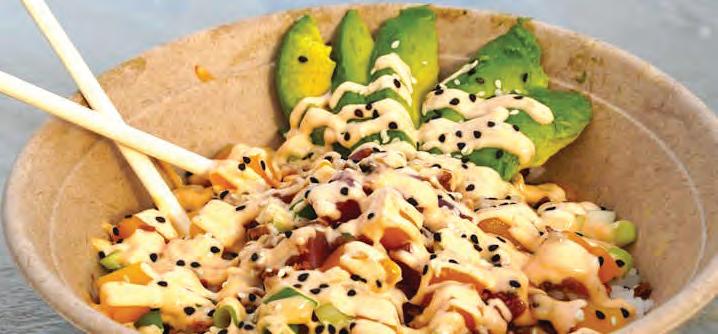
Instagram: @lagoonwatermenalliance

Facebook: Lagoon Watermen Alliance

Donate directly to X4CF toward $4,000 minimum fundraising goal: Corporate Sponsorship Inquiry:





You can see their journey by following Fetch Watersports & Safety on Instagram at @fetch_fla

On June 24th, A.J. Miller and Derick Brown (Team Fetch), who have a combined 35 years as ocean rescue lifeguards, will leave the island of Bimini, Bahamas in the dead of night (approximately 11pm) and embark on a prone paddle journey with their safety boat 8o miles back to Florida, arriving sometime on the afternoon of June 25th. They will complete this paddle along with up to 200 paddlers total, in a challenge known as The Crossing for Cystic Fibrosis.
The Crossing for Cystic Fibrosis is a long-distance endurance paddle challenge and international championship race that takes paddlers across the gul f Stream from Bimini in the Bahamas back to the Florida mainland. The event was inspired because of the incredible health benefits of the ocean for those living with cystic fibrosis, a terminal lung disease. Travis Suit’s (founder) daughter Piper was diagnosed with CF when she was four years old.

The Crossing for Cystic Fibrosis’s goal is to spread awareness, fundraising, inspiration, improved quality of life, and social innovation in the cystic fibrosis community. Through the Piper’s Angels Foundation and other programs, they are able to make a lifelong impact on the patients and families facing the challenges of this heart-breaking terminal disease.
A.J., guarding in Volusia County, and Derick, guarding in Martin County, began racing against one another 12 years ago in local and regional surf lifesaving races. They are now looking forward to the opportunity to race TOgETHER, and for an amazing cause.

Each paddler must raise at least $2,000 each that goes directly to Piper’s Angels Foundation. In addition to their $4,000 minimum fundraising goal, they are seeking corporate sponsorships to assist with the cost of travel, fuel, on course nutrition and equipment. Yellow Dawg Fishing Charters, Knot Racing Charters and Limitless Fishing Charters have joined Fetch Watersports & Safety (owned by paddler A.J.) to help make this challenge a reality.
If you are interested in supporting this challenge and cause, you can assist in any of the 3 ways below:












Let’s grow with Florida together.









Confessions of a Fishaholic, by Thatch Maguire, is a hilarious and irreverent look at one man’s quest to catch fish in spite of life’s annoying interferences. You’ll travel with this awkward adventurer as he risks home and health to pursue his passion for fishing...regardless of the consequences. Anglers of all expertise levels will immediately identify with why his addiction is incurable. This book defines the blurred line between passion and obsession.



Catch a 30-pound ve- sh sack of bass, and you’re pretty much a lock to win whatever tournament you’re shing, right?

Imagine that glorious moment when you’ve been culling 5-pounders and pull into the docks to unload your livewell. With a grin on your face, you haul that huge bag of sh up to the scales…only to nd out your 30-pound sack barely put you in the top 20! at was the reality at a May 6 Roland Martin Marine Center Bass Series event on Lake Okeechobee. e shing was so good that anglers weighed 20 ve-bass limits that were heavier than 30 pounds. It took 36.82 pounds to win. We’re not sure who keeps track of such things, but that’s more 30-pound sacks in one tournament than we’ve ever heard of.


A father-son team of Preston and 11-year-old Tavyn Heisler won the 177-team tournament and a $6,500 big check.

“It was an amazing day,” Preston told a RMMCBS reporter a er the tournament. “I’m still shaking and I couldn’t ask for anything better.”

Tavyn said he was the net man early in the tournament, but he caught his own 8-pounder late in the day. His favorite lure was a black and blue charterbait.
To read a full report on the event, visit: rolandmartinmarinecenterseries.com.

Maguire’s frst work is a compelling, fast read. His style is like a mix of Hemingway with a sardonic blend of Hunter S. Thompson. I couldn’t put it down...
Ben Martin
Editor in Chief Coastal Angler Magazine





Florida’s red snapper season will be 70 days long in 2023 and include both summer and fall dates. In early May, Gov. Ron DeSantis announced what he called the longest combined season since the state took control of red snapper management. e summer season will be 46 days, followed by a 24-day falls snapper season.
“Florida is the Fishing Capital of the World, and the Gulf red snapper season brings anglers from across the country to enjoy our waters,” said Gov. DeSantis. “It is a generational tradition for so many who call Florida home. I am happy that 2023 will be by far the longest combined season since the state assumed management of red snapper.”

e 46-day summer season will begin on June 16 and run through July 31. e 24-day fall season will include all weekends in October and November, Friday–Sunday.




If you plan to sh for red snapper in state or federal waters from a private recreational vessel, even if you are exempt from shing license requirements, you must sign up as a State Reef Fish Angler (annual renewal required). For more information, see GoOutdoorsFlorida.com.


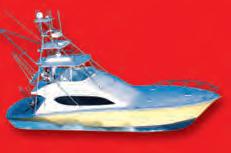

















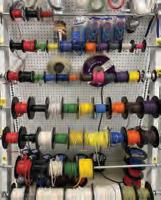

For all science knows about our sheries, there is plenty le to discover. Bone sh & Tarpon Trust scientists recently located a bone sh prespawning aggregation (PSA) in the Florida Keys. e discovery is the rst of its kind in Florida waters and the culmination of a years-long search that utilized acoustic telemetry and the historical knowledge of veteran shing guides.
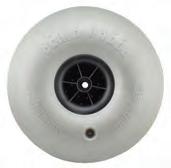
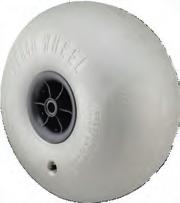
“ is is a major discovery for the Florida Keys shery,” said BTT President and CEO Jim McDu e. “BTT has previously identi ed PSAs in several other countries, but Florida sites remained elusive—until now. By locating this PSA, our scientists will be able to learn more about where and how bone sh spawn in the Florida Keys, which is information critical to the sustained recovery of the population.”

Over the course of the 2022-2023 bone sh spawning season, which spans from October to April, BTT Florida Keys Initiative Manager Dr. Ross Boucek and his team tracked 67 sh and logged more than 94,000 detections. Many of these detections were in the area where BTT research during the 2021-2022 season and reports from shing guides indicated a likely PSA. Fourteen bone sh detected at the suspected PSA site had been tagged at distant ats, including two sh tagged 55 miles away.

e newly discovered PSA is comprised of approximately 2,000 to 5,000 sh and located three to four miles o shore along a reef. Previously documented PSAs in the Bahamas and Belize are located in nearshore waters.


At the site, BTT scientists also observed bone sh gulping air at the surface. Previous research shows that bone sh engage in this behavior before spawning to ll their swim bladders. At night, the sh dive hundreds of feet and rapidly ascend to the surface. e sudden change in pressure during the ascent makes their swim bladders expand, enabling the bone sh to release eggs and sperm. A er fertilization, hatched larvae dri in ocean currents before settling in shallow sand- or mud-bottom bays, where they develop into juvenile bone sh.
“As a Keys shing guide for 53 years, with a science background, I took bone sh for granted—they were what I shed for every day,” said Capt. Rick Ruo , member of the BTT Board of Directors. “I thought that I knew all about the resource, until the population crashed. I discovered neither I, nor anyone else, knew where or how bone sh spawned—a major gap in our knowledge. BTT has come up with the amazing science to determine the dynamics of bone sh spawning. It has been a great lesson to me that we have located this missing piece of the puzzle. To have a healthy population and management goals, you have to understand all aspects of your resource. I am so proud to be part of the BTT science e ort that has unraveled these bone sh mysteries and will witness their rebound.”

Lasting 2-3 times longer than wooden, concrete, and aluminum docks, our modular foating system is the preferred dock choice for residential, commercial, marina, liesure, and other applications. Customizable and confgurable for boat docks, liesure and recreation docks, and drive-on jet ski and personal watercraft!



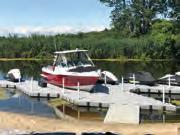

•High-quality plastic
•Environmentally-friendly


•Guaranteed for 20 years
•Near-zero maintenance
•Completely customizable

•UV and pollution resistant

www.candockcf.com



















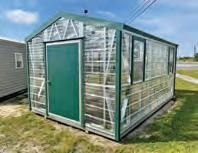
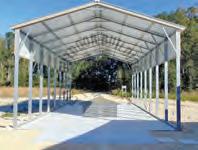



Loop knots leave a small loop of line rather than a knot snug against the hook eye. ey are important to have in your repertoire for shing arti cials because that loop allows a little more movement when you’re working lures like jigs, topwaters and plugs.

e Kreh knot, developed by legendary y sherman Le y Kreh, was originally intended to be used for streamers and bait sh ies. It is also a great choice for conventional anglers throwing any lure that needs a touch of freedom to strut its stu Also known as the non-slip loop knot, it is strong and easy to tie, and it works well with both mono lament and uorocarbon lines.
With the Kreh knot, you give up a bit of strength in comparison to snug Palomar or uni knots, but you’re trading it for lifelike lure action. e
venerable Rapala knot is another great loop knot that might be a little stronger than the Kreh. However, the Kreh is a tad easier to tie, making it our go-to loop knot for lures in freshwater or salt.
For more shing tips and tricks, visit usangler.com.


Nestled on six lush tropical acres of pristine waterfront directly on the Indian River Lagoon, take a step back in time to experience the very best of Old Florida charm with modern conveniences and services to make your stay truly memorable and unforgettable.



• FULLY FURNISHED 3 ROOM COTTAGES WITH FULLY EQUIPPED KITCHENS



Kingfsh Lodge includes a wide screenTV and bar for small gatherings Sailfsh House features a wide covered wrap-around porch for larger groups
• Boat Trailer Parking on site w/ Water and Power
• 250 Foot Dock w/ Covered Area
• FREE Ice / FREE Guest Dockage
• Cable TV, Hi-Speed Internet


• 2 miles to the Ft. Pierce Inlet
• 12 miles to the Gulf Stream

• Laundry, BBQ Grilles and FREE use of our Kayaks




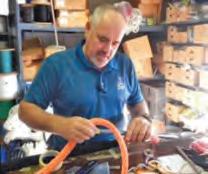
Timothy Crowley was shing Kenansville Lake with Capt. Morris Campbell on March 23 when he caught this 13.10-pound lunker.
Orange Lake keeps pumping out giant largemouth bass. e latest leader in Florida’s TrophyCatch program is a 14-pound, 1-ounce monster from Orange Lake. Chad Dorland caught the sh on April 23 to claim the top spot in FWC’s big-bass recognition program.

Dorland’s sh is the third 13-plus-pounder to come from the 12,550acre Alachua County lake since February. On Feb. 3, Luke Matthews caught a 13-pound, 8-ounce bass at Orange Lake. Anthony Holland caught a 13-pound, 3-ounce beast at Orange Lake on Feb. 25.
Fish weighing more than 13 pounds are awarded Hall of Fame status in the TrophyCatch program. Five Hall of Fame sh have been caught since TrophyCatch season 11 began on Oct. 1, 2022. ree of the ve were caught at Orange Lake, which has also seen 13 other bass weighing more than 10 pounds submitted to the program in that same time period. ose statistics don’t even include all the other lunkers anglers have likely caught and not entered into the program. It’s safe to say Orange Lake is a big-bass factory at the moment.
e other two 13-plus-pound TrophyCatch entries this year were both caught in March. On March 4, Russell Bauknight caught a 13-pound, 8-ounce hawg at Holden’s Pond, which is just up the road from Orange Lake in the same sprawling system of shallow, vegetation- lled waters southeast of Gainesville. On March 23, Timothy Crowley caught a 13-pound, 10-ounce sh that gave him the top spot in TrophyCatch before Dorland caught his 14-pounder. Crowley’s sh came from Kenansville Reservoir down in Indian River County.
For more information, visit www.trophycatch orida.com.


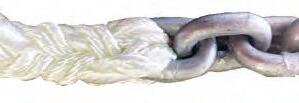




Hand closes Aug. 6, allowing harvest to begin during the weekend in advance of the Fourth of July holiday.
“Extending the season will increase the economic bene ts from this popular recreational shery to local communities in the region,” said Jessica McCawley, Division of Marine Fisheries Management Director. We will continue these e orts by exploring long-term season options for future years via the formal rulemaking process.”

Between 2017 and 2020, FWC took a pilot approach to establish regionally speci c bay scallop regulations while also maintaining the sustainability of local scallop populations. As part of this e ort, the allowable harvest area for scallops was extended to include Pasco County waters starting in 2018. e Pasco Zone for bay scallop management includes all Florida waters south of the Pasco-Hernando county line and north of the Anclote Key Lighthouse, approximately 0.37 miles south of the Pasco-Pinellas county line.



e daily bag limit in this area is 2 gallons of whole bay scallops in the shell or 1 pint of shucked bay scallop meat per person, with no more than a total of 10 gallons of whole bay scallops in the shell or 1/2 gallon (4 pints) shucked bay scallop meat per vessel.


For more information, go to MyFWC.com.












For anglers looking to conquer the toughest offshore conditions, Okuma’s Cavalla 2-Speed Lever Drag reels are the ultimate weapon of choice. Over the past decade, Okuma has cemented its position as a leader in the saltwater market, starting with the groundbreaking Makaira line of reels. Today, the Cavalla 2-Speed Lever Drag is yet another example of Okuma’s unwavering commitment to providing top-tier, reliable products for saltwater anglers.
With its compact, machined aluminum frame and side plates, the Cavalla is a reel that can withstand the toughest conditions Mother Nature can throw at it. The rigid one-piece frame ensures stability and durability, while the cold-forged, type-II anodized machined aluminum spool adds to the reel’s sleek, rugged design. Whether you’re targeting monster grouper, sailfish, giant snapper or other offshore saltwater species, the Cavalla is the reel you want in your offshore arsenal.
The Cavalla reels feature a battle-proven carbonite drag system with Cal’s drag grease that can put out an impressive 24 to 34 pounds of drag at full. The 17.4 grade stainless steel main and pinion gear, along with the CRC coating process, make this reel virtually corrosion resistant. With four corrosion-resistant stainless-steel bearings and a silent retrieve system, the Cavalla operates
smoothly and efficiently, ensuring that you never miss a catch.
Okuma’s Cavalla
2-speed reels feature a 6.4:1 and 3.8:1 gear ratio on the 5 size reels and a 4.7:1 and 2.1:1 gear ratio on the 12 size, allowing for versatile performance across a range of fishing styles. The 5 and 12 size reels come in both left- and right-hand retrieve and feature an on/off bait clicker. The reel’s compact size and comfortable Ergo Grip handle knob and anodized aluminum handle arm make it easy to handle and use for extended periods of time.
So, why should you choose the Cavalla lever drag reel for your next offshore fishing trip? Here are five reasons:

• Durable Construction: The Cavalla’s machined aluminum frame and side plates, along with its corrosion-resistant components, ensure that this reel can handle the toughest offshore conditions with ease.
• Versatile Performance: With its 2-speed capabilities and variable gear ratios, the Cavalla is a reel that can adapt to a range of fishing styles and conditions.
• Smooth Operation: Thanks to its silent

the Cavalla operates smoothly and efficiently, ensuring that you never miss a catch.
• Strong Drag System: The Cavalla’s carbonite drag system with Cal’s drag grease can put out up to 34 pounds of drag, making it a reel that can handle the biggest and toughest fish in the ocean.
• Comfortable Handling: With its compact size and Ergo Grip handle knob and anodized aluminum handle arm, the Cavalla is a reel that you can use comfortably for extended periods of time, even during the toughest offshore fishing trips.
The Okuma Cavalla 2-Speed Lever Drag reel is an all-around, top-of-the-line reel that every saltwater angler should have in their arsenal.
For distributors and retailers, Okuma Fishing Tackle Corporation will be available to meet at ICAST 2023 in Orlando, Fla. July 11-13 at Exhibit Hall Booths 1202 and 1308.

It’s Kingfish Time! The 43rd annual 121 Financial Credit Union Greater Jacksonville Kingfish Tournament is slated for July 17-22, 2023. For five days, with four tournaments and $400,000 in prizes, the “Grandaddy of all Kingfish Tournaments” will keep the docks buzzing with fun events for everyone from die-hard anglers to casual spectators.

The cornerstone of this historic and thriving event is the general tournament, which launches Friday, July 21 with a boat package valued at $160,000 going to the team that lands the largest kingfish. The grand prize is a sweet 25-T Contender with twin 150hp Yamahas, a custom T-top by Custom Marine and an Ameritrail trailer. The tournament pays through 20 places for largest fish and aggregate, as well as a Lady Angler division that pays to 10 places, totaling nearly $250,000 in cash and prizes.

All the boats and the fish coming into the docks at Jim King Park and Boat Ramp at Sisters Creek Park in Jacksonville creates a festival atmosphere. Traditionally, the tournament draws thousands of spectators who enjoy cold beverages, hot food and vendors at the Liar’s Tent. Awards Day on Saturday, July 22 is all about celebration, with Kids Zone activities, drawings and a fishing seminar, followed by eye-popping fireworks in partnership with the City of Jacksonville.
Also for the kids, there is a Junior Angler Offshore Tournament on Wednesday, July 19, as well as a Junior Angler Dock Tournament. The grand prize in the Junior Angler Offshore Tournament is an Ohana 14’ skiff with a 25hp Yamaha and trailer, and this tournament pays through 25 places.
popular Redfish Tournament fishes on Saturday, July 22, with weigh-ins at 2 p.m. during the Awards Day activities.

Through its history, the Greater Jacksonville Kingfish Tournament has been all about putting on a great tournament and helping to provide access to marine resources and promoting education, preservation and research in partnership with its junior anglers and Jacksonville University’s Marine Biology Department. Jacksonville Marine Charities is the operating arm of the event, and it supports non-profits throughout the state. Recently, Child Cancer Fund, the Down Syndrome Association and the Child Guidance Center have benefitted from the organization, which also supports other local charity fishing events like The Premier Trout, Flounder Pounder, Wounded Heroes on the Water and others.
For complete details, go to https://kingfishtournament.com/.
Coastal Angler and The Angler Magazine, Suzuki Marine and Sea Eagle have come together to offer readers a shot at this Sea Eagle FishSkiff 16 paired with a Suzuki DF4 outboard that’ll take you wherever the fish are. The FishSkiff 16 is an inflatable fishing boat that is lightweight, sturdy, stable and extremely packable. It rolls up small enough to fit in the trunk of a car and quickly inflates into a fishing machine. Powered by Suzuki’s four-stroke DF4A, you’ll have to hold on to your hat as you scream over the flats. Designed for efficiency and performance and portability, the DF4A provides all the speed and acceleration you can handle. It’s lightweight and can be attached or removed with ease.


Breakdowns are unpredictable, make them less stressful with an Unlimited Towing Membership from TowBoatU.S. You can relax, we’ve got your back.

This is the time of year when bass gorge themselves on bluegill. One of the best ways to catch bluegilleaters is with a swim jig.
The swim jig is a versatile bait. It can be used in different colors and actions that drive bass crazy. All the variety can make jig shopping a bit overwhelming. There are thousands of color options, countless styles, different hooks and line-tie variations. When I’m looking for the perfect swim jig, I keep a few things in mind. I only throw two different color combinations, bluegill duplicators— the greens, browns and oranges—and a black and blue. You want a jig with a slender head style with a vertical line tie that will come through the cover you’re fishing. I also like a jig with a stout hook. Throwing a swim jig around heavy cover calls for heavy line, and you don’t want your hook to bend out or break when you hook into a big one.
Selection of jig trailers can also be overwhelming. Guess what? I only throw two different styles of trailers. I usually put a swimbait-style trailer with a boot tail on the back, but occasionally I’ll use a craw trailer with two kicker legs. At the end of the day, you just want something back there kicking
and giving your jig some action, and these two styles are my go-to. I match the color of the trailers to the color of the jig.
The cover to target with a swim jig can be endless. They are great in vegetation as well as around docks, wood, rocky banks and for covering water over expansive flats with wood and grass. You can cover a lot of water with this bait, and typically covering more water leads to more bites. You should throw it anywhere bass are chasing bluegills or where bass are actively feeding. I always keep one tied on and ready.
A retrieve I find myself using a lot is a yo-yo retrieve. Point the rod tip high and vary the retrieval speed by either cranking fast and slow or moving the rod tip. This gives the bait some erratic movements and drives them crazy. I also use a steady retrieve. Depending on the part of the water column you are trying to target, you can reel the bait fast and keep it up high—even on the surface—or slow it down and creep it deeper, maybe to keep it around some submerged cover.
Fishing cover requires heavier equipment. I fish a heavy action rod with a length between a 7’3” and 7’6”. The 13 Fishing Defy Black 7’5H is a super affordable rod and is awesome for the job. Pair the rod up with a fast reel like the 13 Fishing Concept A 7:5 spooled up with 50-pound Seaguar Smackdown braid, and you are ready to put some fish in the boat.

Tyler Woolcott is a professional tournament angler and guide. Check out his website at www.tylerwoolcottfishing.com.
















































The super sleek, super stable inflatable FishSkiff™ 16 now features a patented drop-stitch outside keel for precise steering and better open sea motoring performance! Due to the new ultra-light, ultra-strong fusion technology that bonds two layers of reinforced PVC together the FishSkiff™ is super tough and super stable. Great for 1, 2 or 3 anglers.


Whether you use a gas or electric motor, the in atable FishSki ™16 will get you to the sh. Add a canopy for protection from the sun or rain. Add a solar panel for perpetual power that can keep your electric motor battery charged; whether your camping, live on the water or just love the idea of solar power.
With the NEW drop-stitch keel, you’ll have less course correction and improved performance. The low gunwales give you superb access to the water for landing sh, releasing sh, and getting on & o the boat.




















In early May, a 600-plus-pound bluefin tuna was brought to the docks at Alabama’s Orange Beach Marina. It was not a world or state record, but it was a giant fish and a first for Capt. Johnny Greene who has been a charter captain for the last 33 years.

According to the story written by David Rainer for the Alabama Department of Conservation and Natural Resources (ADCNR), Greene and his crew aboard the Intimidator were hosting a group of anglers from Georgia on a three-day trip deep into the Gulf of Mexico. Greene said he has encountered big bluefins before in the April and May timeframe, when they arrive in the Gulf to spawn, but he’s never managed to put one in the boat or even “slow one down.”



“Last year we hooked one about noon and fought that fish four or five hours. We had 10 people on that charter, and they ended up changing the rod between anglers probably 20 or 25 times,” he told ADCNR. “We ended up breaking a rod after fighting him that long. We were so close, so that one was really a heartbreaker.”
This recent trip did not end in heartbreak. After hooking the fish, the Intimidator chased it for about 2 miles before getting to within 100
feet of the leader. Then the fish dove deep. They managed to stop the dive with a Shimano 50-wide and a stand-up harness, and after battling it for about four hours they could tell the fish had died. They began the laborious process of winching it up on 80-pound-test mono.
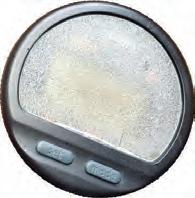


“When you have to pull a 600-pound animal up, it’s not the easiest thing to do,” he told ADCNR. “It requires communication between the angler, everybody in the cockpit and the wheelhouse. It’s basically a momentum game. You’ve got to get the fish coming up, and you have to keep him coming. If you take a break, the fish is going to start sinking again. It’s tricky.”


The celebration began when they finally brought the giant fish to the surface and tethered it with a tail rope. They used a come-along to hoist it into the boat.


Knowing their fish was not a record, the crew went ahead and gutted it and iced it down to preserve the meat during the ride home. It weighed 579 pounds gutted, with an estimated total weight of 625 pounds. The Alabama state record, caught in 2006, weighed 829 pounds.
To read David Rainer’s entire account of the catch, go to www.outdooralabama.com.





believe the popping cork found its beginnings in the 1930s, and it’s still a mainstay in most saltwater anglers’ tackle boxes. Many versions have been introduced along the way and undoubtedly more will come. One thing is for certain, if they didn’t work, they would not have lasted for nearly a century. In Texas, a popping cork typically finds itself dragging a live shrimp, but there are other options. What makes the popping cork stand out is the cupped top, which creates a popping sound and splashes water forward when twitched. It simulates a fish feeding on the surface.


I was once no different than the masses tossing live shrimp under a cork, but in the early 2000s— when I had already turned my focus to exclusively lure fishing—I found another place for the simple but effective popping cork.
At that time, our famous Baffin Bay was plagued with brown tide, an algae bloom that turns the water, well, brown. The water had nearly zero visibility, which made fishing soft plastics difficult at best. Looking back, I wish I had already invented my Knockin Tail Lures with the built in tail rattle, but better late than never. At the time, I started using lures under a cork instead of live shrimp. I realized a noticeable increase in the number of fish I was able to catch. Depending on the circumstances, I would use a jighead, a weighted weedless hook or an unweighted hook about 24 inches under my cork. Although I heard
a lot of grief from my buddies who would not touch a popping cork, it worked and I continued to out fish them on most trips. I stayed with this technique in Baffin until the brown tide cleared.
A lure under a cork is also a great way to introduce kids to lure fishing. Paddletails, twitch baits and artificial shrimp all work well with this strategy. The method takes a lot of the hand coordination out of the picture for children and lets them realize that you don’t need live bait to catch fish.

Another of the many options this cork gives the angler is a way to effectively fish jetties. At times, trout will suspend 8 to 10 feet deep off the rocks. In this situation, the popping cork’s sound creating ability is still important, but it needs to be modified. Casting a cork with 10 feet of leader to get your lure down to the fish creates a challenge. This is where the slip cork method comes into play. With a slip cork, you can cast a 2- or 3-foot leader or less, but the cork will have a rubber stop that allows your bait to sink to the desired depth where the bite is. Look up slip cork for more on this method.
The weather is warm, don’t forget to take a kid fishing!
To some, sunglasses are a fashion accessory…
Drivers’ Alert: Driving can expose you to more dangerous glare than any sunny day at the beach can… do you know how to protect yourself?
Thesun rises and sets at peak travel periods, during the early morning and afternoon rush hours and many drivers find themselves temporarily blinded while driving directly into the glare of the sun. Deadly accidents are regularly caused by such blinding glare with danger arising from reflected light off another vehicle, the pavement, or even from waxed and oily windshields that can make matters worse. Early morning dew can exacerbate this situation. Yet, motorists struggle on despite being blinded by the sun’s glare that can cause countless accidents every year. Not all sunglasses are created equal. Protecting your eyes is serious business. With all the fancy fashion frames out there it can be easy to overlook what really matters––the lenses. So we did our research and looked to the very best in optic innovation and technology. Sometimes it does take a rocket scientist. A NASA rocket scientist. Some ordinary sunglasses can obscure your vision by exposing your eyes to harmful UV rays, blue light, and reflective glare. They can also darken useful vision-enhancing light. But now, independent research conducted by scientists from NASA’s Jet Propulsion Laboratory has brought forth ground-breaking technology to help protect human eyesight from the harmful effects of solar radiation
Eagle Eyes®
Lens
more vivid and sharp. You’ll immediately notice that your eyes are more comfortable and relaxed and you’ll feel no need to squint. The scientifically designed sunglasses are not just fashion accessories—they are necessary to protect your eyes from those harmful rays produced by the sun during peak driving times.
light. This superior lens technology was first discovered when NASA scientists looked to nature for a means to superior eye protection— specifically, by studying the eyes of eagles, known for their extreme visual acuity. This discovery resulted in what is now known as Eagle Eyes
The Only Sunglass Technology Certified by the Space Foundation for UV and Blue-Light Eye Protection. features the most advanced eye protection technology ever created. The TriLenium Lens Technology offers triple-filter polarization to block 99.9% UVA and UVB— plus the added benefit of blue-light eye protection. Eagle Eyes® is the only optic technology that has earned official recognition from the Space Certification Program for this remarkable technology. Now, that’s proven science-based protection.
The finest optics: And buy one, get one FREE! Eagle Eyes® has the highest customer satisfaction of any item in our 20 year history. We are so excited for you to try the Eagle Eyes® breakthrough technology that we will give you a second pair of Eagle Eyes® Navigator™ Sunglasses FREE––a $59.95 value!
That’s two pairs to protect your eyes with the best technology available for less than the price of one pair of traditional sunglasses. You get a pair of Navigators with stainless steel black frames and the other with stainless steel gold, plus one hard zipper case and one micro-fiber drawstring cleaning pouch are included. Keep one pair in your pocket and one in your car. Your satisfaction is 100% guaranteed.
If you are not astounded with the Eagle Eyes® technology, enjoying clearer, sharper and more glare-free vision, simply return one pair within 30 days for a full refund of the purchase price. The other pair is yours to keep. No one else has such confidence in their optic technology.Don’t leave your eyes in the hands of fashion designers, entrust them to the best scientific minds on earth. Wear your Eagle Eyes® Navigators
Studies by the National Highway Traffic Safety Administration (NHTSA) show that most (74%) of the crashes occurred on clear, sunny days


Navigator™ Black Stainless Steel Sunglasses
Receive the Navigator™ Gold Sunglasses (a $59.95 value) FREE!



just for trying the Navigator™ Black
Navigator™ Gold Stainless Steel Sunglasses
Certified EAGLE EYES® was developed from original NASA Optic technology and was recently inducted into the Space Foundation Technology Hall of Fame.

Fit-ons available for $39 +S&H
Black or Tortoise-Shell design
with absolute confidence, knowing your eyes are protected with technology that was born in space for the human race.
Two Pairs of Eagle Eyes® Navigator™
Sunglasses $119.90†
Offer Code Price $49 + S&P Save $70.90
Offer includes one pair each Navigator™
Black and Navigator™ Gold Sunglasses
1-800-333-2045
Your Insider Offer Code: EEN957-06
You must use this insider offer code to get our special price.
14101 Southcross Drive W., Ste 155, Dept. EEN957-06 Burnsville, Minnesota 55337 www.stauer.com
the offer code versus the price on Stauer.com without your offer code.
If this potbellied 73.29-pound lake trout isn’t a new world record, it should be.

Scott Enloe and his son Hunter were fishing an undisclosed Colorado lake in early May when Scott hooked into the 47-inch-long monster on a 6-inch tube jig and 10-pound test. According to Free Range American, it took 13 tense minutes to fight the huge laker boat-side, and both men had to haul it over the side because their net was too small to land the fish.
The fish was full of eggs and had an incredible girth of 37 inches. After some photos and measurements, they released it to go lay those eggs and spread the genetics for obesity.
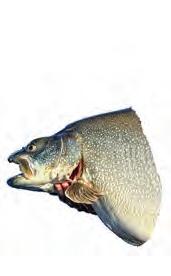
The IGFA all-tackle world record for lake trout weighed 72 pounds, even. It was caught in 1995 by Lloyd Bull at Great Bear Lake in Canada. With the strict procedures required by IGFA for record consideration, it is unlikely Enloe’s fish will break the all-tackle world record, but there is a chance the organization will consider it for a world length record.
The current Colorado state record weighed 50.35 pounds. It was caught by Donald Walker in 2007. We’re not sure about Colorado’s record submission requirements, but most states require a weight taken on certified scales.
Regardless, it is the fish of a lifetime for Enloe, and if it doesn’t qualify for a record… it should.
To read the full report from Free Range American, go to https:// freerangeamerican.us/world-record-lake-trout-enloe/
There’s no doubt these guys can get it out past the breakers. The Carolina Surf Casters Association gets together four times a year to hold distance-casting competitions. In an April contest, North Carolina’s Ryan Lambert set a record for the longest fishing cast in U.S. history. He launched a massive 889-foot, 4-inch cast.
Lambert is a frequent competitor in the sport of surf casting, known in Europe as long distance casting of sea weights, in which participants gather on a large marked field with surf fishing tackle to see who can cast different sizes of large sinkers (3.5 to 8 ounces) the farthest.
Though the sport originated in the U.S., reportedly as far back as the 1890s, it has become more popular in Europe and South America in recent decades. Only three surf casting clubs exist in the U.S. today. They are SurfCast USA (SCUSA), based in Maryland, Surf Fishing & Casting Club International (SFCCI), on Texas’ Gulf Coast, and Carolina Surf Casters Association (CSCA), in eastern North Carolina.
Lambert is the vice president/secretary of the CSCA – a more than 10-year-old organization with members from North Carolina, South Carolina, Delaware, Virginia, Maryland and Texas. The club organizes four competitions per year in spring and fall. These events are open to surf casters of all skill levels.
Lambert, a sales representative for a large agricultural supplier, lives in Angier, N.C., with his wife Blair and their two daughters. He’s an experienced saltwater fisherman who, like most competitive casters, originally developed long-distance casting skills to improve catch rate from piers and the beach. He learned those skills under the tutelage of fellow North Carolinian and long-time U.S. surf casting champion Tommy Farmer.
Tapping into his athleticism from playing baseball for N.C. State University, Lambert is able to generate huge power using a pendulum cast. This highly specialized technique involves swinging the sinker into an orbit around the tip of a long 12- to 14-foot surf rod, and at a precise moment, rotating the body and rod through a large arc, ending with a powerful punch-pull motion with the right and left arms.
“It’s great that one of our own from North Carolina—someone from our club, no less—was able to set this new benchmark,” said Matt Tuers, president of the CSCA. “One of the main objectives of this organization is to grow a community where U.S. casters can develop and start taking back the international records. Casters like Ryan are in a position to do that, as well as inspire the next batch of elite American competitors.”
The current world record longest cast is held by “Big Danny” Moeskops of Belgium with a 940 foot cast made in the early 2000s. The previous U.S. record was held by Will Nash of Texas, with 873 feet.
Check out CSCA at carolinasurfcasters.org.



Watauga River
Home of world class fishing on the beautiful Watauga Lake, rugged Doe River and designated trophy trout stream, Watauga River PLAN
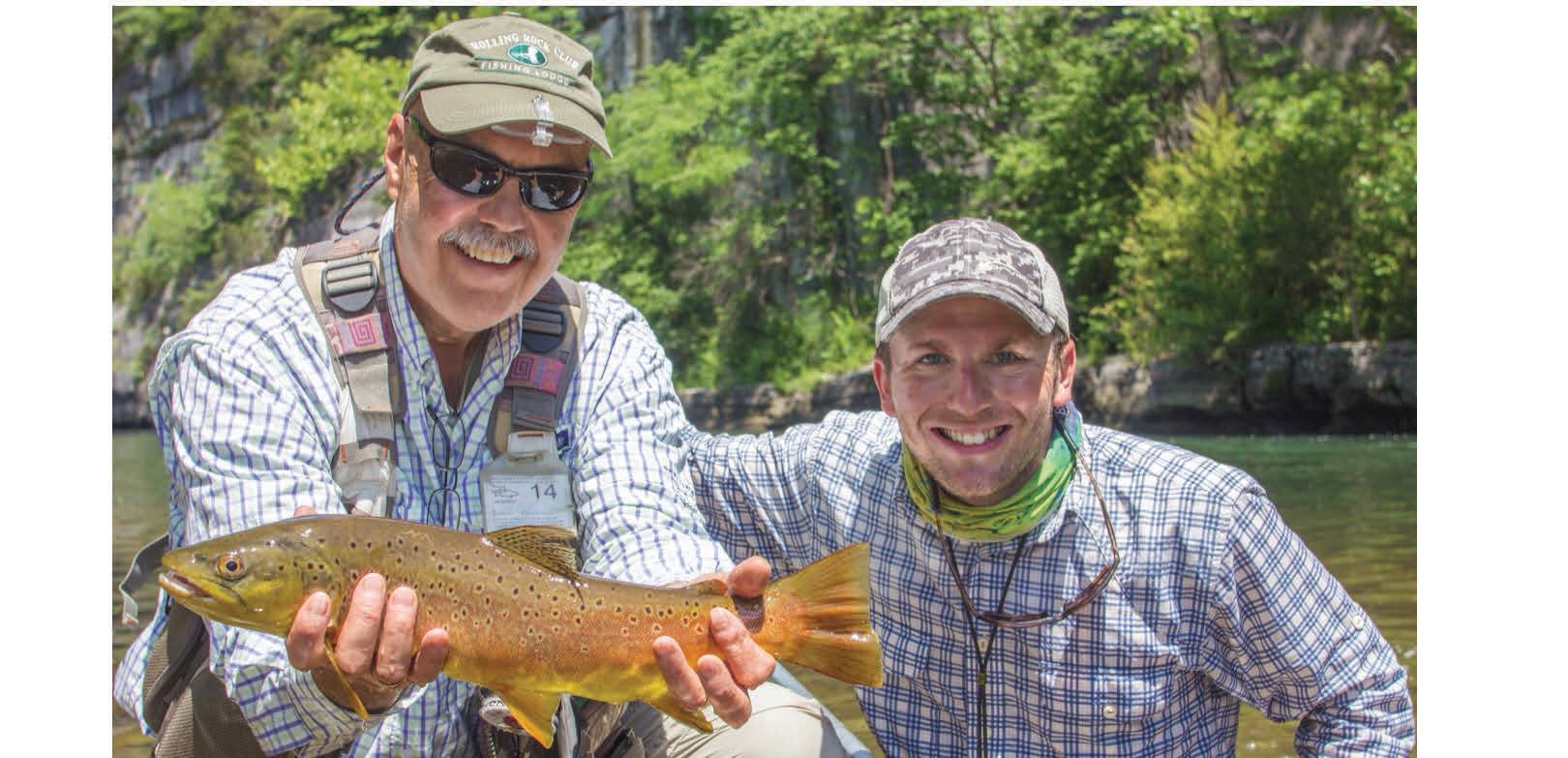

Watauga Lake
Doe River

